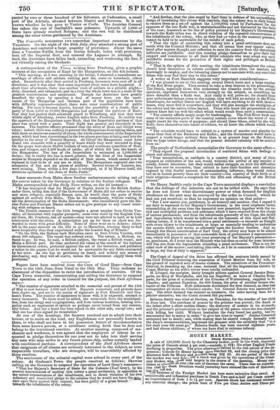A correspondent of the Time., writing from Presburg, gives a
graphic account of the occupation of Raab by the Hungarians, on the 4th instant. "This morning, as I was standing on the bridge, I observed a tumultuous as- semblage of officers and soldiers rushing past me, some on horseback, others afoot. Immediately after their arrival in Presburg, horsemen were sent off in all directions; and it was clear that some important event must have happened. A short time afterwards, there was another rush of soldiers in a pitiable plight—. dirty, disarmed, and exhausted; and in a trice the whole town was in a state of the greatest consternation and excitement. Though the Austrians have greatly benefited the place by spending a deal of money here, yet the senti- ments of the Hungarian and German part of the population have been with difficulty repressed—indeed, there were some manifestations of public feeling. For soon it became known, beyond the possibility of a doubt, that a party of from 5,000 to 10,000 Hungarians had surprised the garrison of Raab; that they had _pushed their advanced guard to Wieselhurg, and that they were within sight of Altenburg, twelve English miles from Presburg. So sudden was the approach of the Hungarians upon Raab, that the Imperialist garrison of that place was seized with a panic. Their flight was general and disorderly in the extreme. The fugitive officers presumed that the cities of Raab and GOrgo were taken: indeed, there was nothing to prevent the Hungarians from taking them, and with them an enormous quantity of stores, the whole commissariat of the Imperialist army, which had been concentrated in the two places previous to being sent into the interior to the army of General Haynau. At Gdrgd the Hungarians must have found two steamers with a quantity of boats which they were intended to drag. On the quays were above 80,000 bushels of oats and enormous quantities of flour, rice, and vinegar, and 2,400 heads of cattle; all of which fell into the hands of the Hungarians. The loss of the Imperialists is estimated at 1,000,000 of florins; but in reality the loss is much greater, for the lives of the Imperialist armies in Hungary depended on the safety of their stores, which cannot now be replaced in time to be of any use to them. The Hungarians captured also two companies of foot and six pieces of artillery. Several troops of Lancers, too, were missing. Thus, within a few days is revenged, as if by Heaven itself, the atrocious spoliation of the Jews of Buda-Petah.'


























 Previous page
Previous page